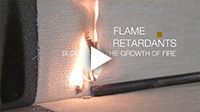

News
TEN YEARS OF GREENING THE VALUE CHAIN
It is a decade since the UK Textiles Finishers Association, with the support of the European Flame Retardants Association (EFRA) and the EU member states, committed to an environmental Code of Good Practice to reduce the potential emissions of brominated flame retardant Deca-BDE into the environment.
This industry initiative, ‘Voluntary Emissions Controls Action Programme' (VECAP), was soon extended to other downstream users of flame retardants in textiles and plastics. It is encouraging to see how, throughout the years, the scope of the initiative has begun to be expanded to include more flame retardants and has been adopted by suppliers and users across the world.
VECAP aims at reducing emissions of brominated flame retardants (BFRs) by promoting environmental and industrial process best practices throughout the value chain, from producers to downstream users.
The progress report published for 2013 shows that potential emissions have significantly declined since reporting began in 2008. In most cases, potential emissions reached default values, meaning that they are showing the lowest readings achievable when applying the Best Available Techniques described in the VECAP best practice tools.
Regarding specific flame retardants, the 2013 European progress report showed negligible potential emissions to land for hexabromocyclododecane (HBCD), demonstrating that it is possible for the programme to help users reduce, and even avoid, emissions to land. Another testimony to the success of the scheme is the responsible disposal of the waste generated by users for the full volume of tetrabromobisphenol-A (TBBPA), Deca-BDE and HBCD sold in the survey year, demonstrating the industry's commitment throughout the value chain. Reporting of a new brominated flame retardant, EBP, was included for the first time.
The 2013 report revealed that potential emissions of flame retardants to water and air are at default values obtained when VECAP best practices are applied. Participation in the programme was already high among EBP users, already covering 87.1% of the volume sold, and sets a good starting point for implementation and future reporting. Considering that 10 years ago there was no such responsible industry initiative, these results are encouraging.
Misconceptions about BFRs are common; recent coverage associated Brominate Vegetable Oil (BVO) a food additive used in soft drinks with flame retardants; moreover, this comes at a time when fire safety standards have been called into question.
Flame retardants play a critical role in reducing the impact fires have on people, property and the environment. BFRs are often considered by manufacturers to be the most optimal flame retardants to use, from a technical, performance and economic point of view. Such decisions include consideration of the suitability of the flame retardant for the material in its intended use, costeffectiveness, stability and ensuring that the substance will provide the highest level of fire safety throughout the service life of the final product.
Through VECAP, the industry commits to being proactive and transparent about its willingness to continuously improve and to encourage a responsible value chain.
Ten years after the launch of the programme, VECAP operates under the principles of Responsible Care and it remains an integral part of environmental best practices amongst engaged companies. Participation continues to be high: the latest survey covers 93% of the total volume of the four common brominated flame retardants sold by the EFRA member companies involved in the programme.
Looking forward, members of the programme are committed to increasing the number of users participating in VECAP, to build on the years of experience with the methodology to apply it to more substances and to include in the programme flame-retardant containing materials at the end of their service life.
The principle of continuous improvement, close cooperation and the efforts of a dedicated product stewardship team committed to addressing new issues in the process of handling and treating of chemicals have been central to the success of the programme.
More collaboration with users throughout the value chain, and indeed from other value chains, is welcomed. All actors in responsible industry should be working together to reduce potential emissions of chemicals to the environment, via VECAP best practices and certification.
View the article here

-
"Proceeding with a voluntary undertaking like VECAP allows a continued use of a chemical substance when, for example, there are concerns about its harmfulness, but it is nonetheless considered essential to society. We hope that this undertaking will continue to go forward smoothly, with the understanding of the concerned business entities."Japanese Ministry of Economy, Trade and Industry (METI)









